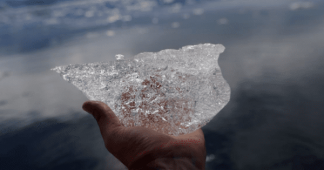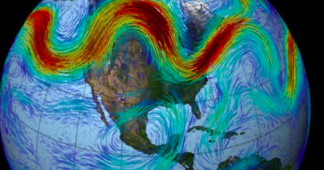By Jonathan Watts
We set out across the ice-filled Antarctic bay to listen for whales, but first we heard something altogether different: an upside-down sound below the Southern Ocean, something like the sound of climate crisis itself.
Our small motor dinghy was carrying seven passengers – a polar guide, two Greenpeace activists, two journalists, a camera operator and a scientist specialising in marine acoustics. All around us were jagged, brilliant white peaks, piercing blue glaciers and water flecked with such a constellation of ice fragments that you could imagine a sky-sized mirror had shattered on to the surface of the ocean.
The pilot cut the outboard engine to reduce noise while the scientist, Tim Lewis, dropped the hydrophone – essentially a waterproof microphone on a long cable – into the ocean. We sat quietly as the boat bobbed and drifted to within a few metres of an iceberg the size of a church. Dozens of gentoo penguins swished in and out of the water. Further off, we could hear the intermittent rumbles of avalanches as mountain snow warmed and collapsed in the pale southern summer sun.
But it was the underwater soundscape that we had come to hear. After playing out 20 metres of cable, Lewis took off his woolly hat, put on the headphones, closed his eyes and let his ears take him down to the depths. We watched his face for clues as to what he was hearing. First a frown. (Is the equipment working properly?) Then a look of bemusement. Finally a wry smile. “I have never heard anything like it. Not what I expected at all,” he said. “It sounds like dripping, like the inside of a gorge.”
The earphones were passed from person to person. Everyone listened with a similar expression of concentration and offered their own interpretation of these strange sounds. “Drips in a drain,” said one of the activists. “Forest waterfall,” said the coxswain. “Rainfall on city streets,” said the camera operator.
My turn came, and I, too, was transported. Not, it seemed, below the ocean, but into a vast cavern, where it sounded as if water was cascading from a high ceiling, each drip echoing through the emptiness.
Read more at www.theguardian.com











